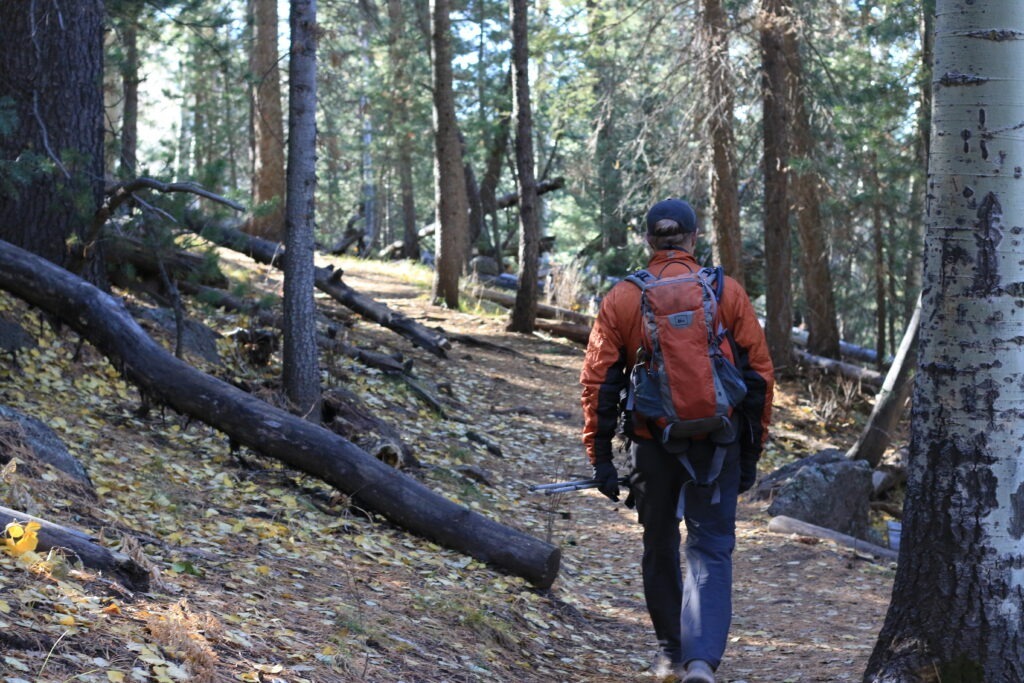Have you ever wondered why a hike through the wilderness leaves you feeling recharged and revitalized? A peaceful walk amongst towering trees, chirping birds, and the gentle rustle of leaves underfoot can do wonders for alleviating stress. But what’s the science behind this seemingly magical transformation? Let’s embark on this fascinating journey to discover how hiking reduces stress and helps to make you feel amazing!
1. Fresh Air and Natural Surroundings
Hiking allows us to immerse ourselves in nature, away from the hustle and bustle of urban life. The fresh air and the beautiful green environment helps to alleviate stress. Breathing in clean air improves blood pressure and heart rate, while visually pleasing natural landscapes promote relaxation and tranquillity. Studies suggest that exposure to green spaces reduces cortisol, a common stress hormone, contributing to improved mental well-being.
2. Physical Exercise
Hiking helps to stimulate the production of endorphins, our body’s natural mood lifters. Exercise also promotes better sleep, which in turn alleviates stress. Physically challenging ourselves can provide a sense of achievement, enhancing self-esteem and resilience. Regular exercise fosters discipline and routine, which could have a ripple effect on other areas of life, promoting overall stress management.
3. Nature Immersion
The act of immersing oneself in nature, often termed ‘forest bathing,’ has profound impacts on mental well-being. Studies reveal that it boosts concentration, improves mood, and enhances cognitive functions. It acts as a sensory feast, engaging all your senses in a tranquil spectacle of nature’s beauty. This disconnection from the hustle-bustle and connection with nature can stimulate mental health, further lowering stress levels.
4. Mindfulness and Meditation
Hiking inherently encourages mindfulness and meditation. As you navigate the trails, your focus naturally shifts away from stress-inducing thoughts and toward the present moment. The rhythmic pattern of your steps, the sensation of the wind against your skin, and the variety of nature’s colors, bring attention to the ‘now,’ effectively grounding you in mindfulness. This element of meditation, coupled with the natural surroundings, contributes significantly to the overall stress-reducing impact of hiking.
5. Connection with Nature
A profound connection with nature is another significant stress-reducing aspect of hiking. As individuals encounter wildlife, admire diverse flora, or marvel at stunning landscapes, they cultivate a stronger appreciation for the natural world. This deepened connection fosters a sense of fulfillment and peace, further mitigating stress. Ultimately, hiking is a holistic therapeutic activity, intertwining physical exertion, nature immersion, and mindfulness to combat stress effectively.
6. Social Interaction
Hiking is often a social activity, providing opportunities to connect with like-minded individuals or strengthen relationships with friends or family. These social interactions, while surrounded by the calm of nature, can lead to a shared sense of accomplishment, reinforcing positive emotions. Interacting with others can also serve as a distraction from stress-inducing thoughts, thereby further reducing stress levels. Additionally, social support is a crucial element for mental well-being, making the social aspect of hiking an essential contributor to its stress-reducing benefits.
7. Escape from Technology
Technology has taken over our lives, blurring the lines between work and personal time. Hiking provides a much-needed escape from technology, allowing individuals to disconnect and recharge. The absence of constant notifications, emails, or social media updates provides a much-needed break for the mind, allowing it to rest and rejuvenate. This respite from technology can significantly reduce stress levels and promote overall mental well-being.
8. Increased Exposure to Sunlight
Increased exposure to sunlight while hiking offers health benefits. Sunlight triggers the body’s production of vitamin D, known as the ‘sunshine vitamin.’ This is crucial for bone health, immune functions, and mood regulation. It also helps regulate our circadian rhythm, promoting better sleep. Moreover, sunlight boosts serotonin levels, a ‘happiness hormone,’ thus reducing stress. Caution, however, must be exercised to avoid harmful UV rays. Proper protection, such as sunscreen, hats, and appropriate clothing, should always be used.
9. Sense of Achievement
Achieving a sense of accomplishment is a powerful stress reducer. Successfully reaching a trail’s end or climbing to a summit provides a tangible symbol of overcoming challenges. This achievement instills a sense of pride and boosts self-efficacy, the belief in one’s ability to succeed. This psychological boost is invaluable in mitigating stress, positioning hiking as a holistic method for maintaining mental well-being.
10. Fulfilling the Spirit
Hiking is a spiritual pilgrimage, a journey of self-discovery and rejuvenation. As one traverses the wilderness, every step in solitude or companionship nourishes and fulfills the spirit. The sheer majesty of nature and its profound silence can foster a deep connection with the universe, providing a profound sense of peace and fulfillment. In this vast, open space, one often finds the room to reflect, contemplate, and be simply present, nourishing the soul and spirit.
11. Release of Endorphins
Physical activity, particularly in a natural setting like hiking, leads to the release of endorphins. These biochemical compounds, often called “feel-good hormones,” are generated in response to exercise. Their production elevates mood, provides a sense of well-being, and acts as a natural painkiller. Alongside reducing stress and anxiety, releasing endorphins during hiking enhances the overall experience, making it an enjoyable and beneficial activity for both physical and mental health.
In conclusion, hiking is a powerful antidote to stress, intertwining the physical benefits of exercise with the serene beauty of nature. Immersed in this calming environment, our bodies respond by lowering cortisol levels, uplifting mood, and sharpening cognition. So, the next time you feel overwhelmed, consider lacing up your boots and heading for a therapeutic trek in the great outdoors.

